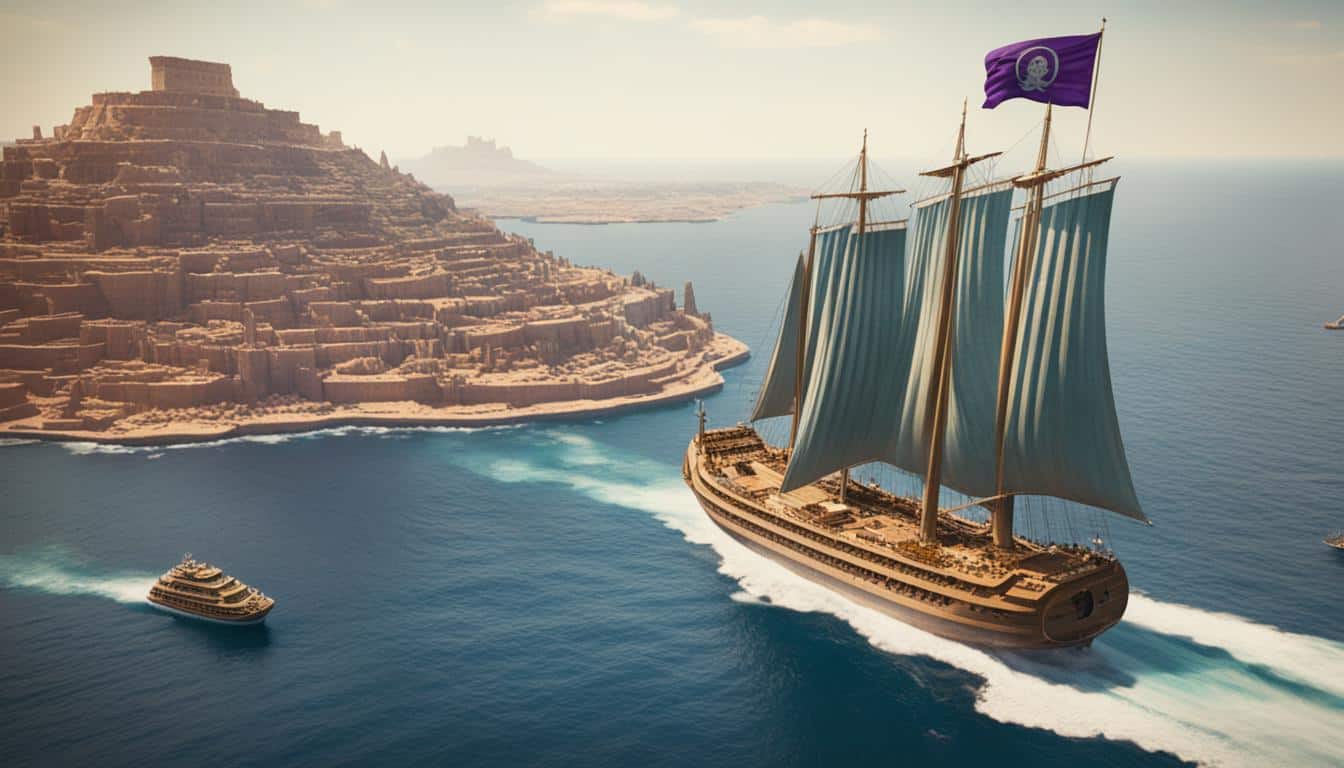Table of Contents
Did you know the ancient Phoenicians had links to the Bible? They were known for their trade by sea and had a big influence on biblical prophecies. Today, we’ll look into the stories that connect them to biblical history.
Civilizations have affected religion, trade, and cultures over the years. The Phoenicians, famous for their sea trade, were key players in biblical stories. Their stories live on in the texts we read today.
So, how are the Phoenicians linked to one of the most important books in the world? Let’s explore these unique biblical connections.
Now, we’ll focus on six special links between the Phoenicians and the Bible. We’ll talk about how they worked with King Hiram of Tyre and King David. Plus, we’ll look into their role in building the temple and how they influenced prophecy. It’s all about uncovering the amazing tales of these ancient people.
Ready to learn more about the Phoenicians and their place in the Bible? Join us to discover the important role they play in connecting these ancient stories.
The Phoenicians as Seafaring Traders in the Bible
The Phoenicians played a key role as seafaring traders in ancient times. The Bible highlights their rich maritime history and interactions with old civilizations.
They worked closely with King David of Israel. An example of their trade was in 1 Kings 5:5-6. King Hiram of Tyre sent cedar wood and experts to help build King David’s palace. This shows the strong trade links between the Phoenicians and the Israelites.
The workers from Tyre helped build King David’s grand palace. This event showcased the Phoenicians’ knowledge in architecture and building.
The Phoenicians were well-known for their sea trade. They built rich trading paths across the Mediterranean. This allowed them to share goods, ideas, and culture with many lands.
Trade and Cultural Exchange
The Phoenicians enhanced cultural exchange through their trading voyages. Their trade spanned from the eastern Mediterranean to places like Egypt, Greece, and Spain.
They were skilled at sailing and knowing the seas. This let them set up trading posts in key places. Their ships were fast and easy to steer, thanks to sails and oars.
| Commodities Traded | Trade Partners |
|---|---|
| Precious metals and gemstones | Egypt, Greece |
| Timber and building materials | Israel |
| Textiles and dye | Pharaoh’s court in Egypt |
| Tin and other metals | Britain, Spain |
The Phoenicians’ skills in sailing and their extensive trade had big impacts. Their work advanced old world economies and cultures significantly. Their tale as traders in the Bible shows the heights of their sea discoveries in history.
The Phoenicians and the Temple’s Precious Dyes
In the Bible, there are clear instructions for building the sacred tabernacle and later, the grand temple. It talks about using various materials and colors. The Phoenicians stood out in making beautiful, colorful fabrics with precious dyes.
The Tyrian purple was very important. It was talked about in Exodus 26:1, Exodus 27:16, and Exodus 39:1. This dye colored curtains, hangings, and priestly garments. It showed the holiness and high status of the priests.

The Phoenicians were experts in making Tyrian purple from the Murex snail’s glands. Making this dye involved a complex process. They had to crush thousands of snails to get the dye. The color they achieved was seen as a symbol of wealth and royal status.
The Phoenicians were famous for their dyes across the Mediterranean. Their use in the temple spoke of the Phoenician’s high skills. It showed how dedicated they were to creating beautiful, sacred places.
Using these special dyes in the tabernacle and temple’s fabric was very meaningful. It showed the importance of colors and skill in worship. These acts also showed how much the Phoenicians added to the amazing world of ancient temples.
Jezebel, the Phoenician Princess
Jezebel was a Phoenician princess who married King Ahab of Israel. She came from Sidon, a rich Phoenician city known for trading by sea. Her father was King Ethbaal.
Jezebel’s marriage to Ahab linked the Phoenicians and Israelites politically. It also brought Phoenician ways and their god, Baal, into Israel. This changed how people worshipped in Israel greatly.
In the Bible, Jezebel is remembered as being powerful and strong. She encouraged worshipping Baal and went against the Israelite’s God. This led to fights among the people in Israel.
“And it came to pass, as if it had been a light thing for him to walk in the sins of Jeroboam the son of Nebat, that he took to wife Jezebel the daughter of Ethbaal king of the Zidonians, and went and served Baal, and worshipped him.”
The tale of Jezebel shows how Phoenician and other ancient cultures mixed. This mix changed the religion and beliefs of the Israelites. It shows how the Phoenicians influenced Israel’s culture.
Jezebel leaves a strong mark on history. She reminds us of the Phoenicians’ big role in old times and their effect on religion and history.
Summary:
Jezebel, a Phoenician princess, married King Ahab of Israel. This linked Phoenician culture and the worship of Baal with Israel. It changed Israel’s religion and showed the mix of cultures in ancient times.
Prophecies and Symbolic Language Regarding Tyre and Sidon
Looking into Phoenician history, we find interesting prophecies about the cities of Tyre and Sidon. These prophecies, detailed in Ezekiel and Isaiah’s books, foretell the fall of these cities. They also talk about how their trade will be interrupted.
The prophecies in Ezekiel 26 and 27 warn Tyre, a key Phoenician city, about its future. The prophet said Tyre’s wealth from trading would vanish. He also mentioned the break in trade routes that would severely harm the Phoenicians.
“Son of man, because Tyre has said against Jerusalem, ‘Aha, she is broken who was the gateway of the peoples; now she is turned over to me; I will be filled; she is laid waste.’ therefore thus says the Lord God: Behold, I am against you, O Tyre, and will bring up many nations against you, as the sea brings up its waves. They shall destroy the walls of Tyre and break down her towers, and I will scrape her soil from her and make her a bare rock. She shall be a place for the spreading of nets in the midst of the sea. For I have spoken, declares the Lord God. And she shall become plunder for the nations.” – Ezekiel 26:2-5
In a similar vein, Isaiah 23 predicts Tyre’s fall and the sadness about the trade routes’ disruption. The prophecy dramatically describes Tyre moving from glory to desolation.
“And in that day Tyre will be forgotten for seventy years, like the days of one king. At the end of seventy years, it will happen to Tyre as in the song of the prostitute:” – Isaiah 23:15
The poetic nature of these prophecies highlights the Phoenician cities’ sharp decline. The loss of trade routes hints at their economic downfall and a drop in power and influence.
To really understand what awaited the Phoenicians, we must dig deep into these prophecies. This is key to seeing how they sync with Tyre and Sidon’s histories.

The Symbolic Language of Trade Disruption
The trade route disruptions symbolized more than just economic trouble. Tyre and Sidon were known for their vast trading networks, which connected many places and cultures.
The breakdown of these trade paths meant a bigger change for the Phoenicians. It marked the end of their golden age, as their trade was their main source of wealth and power.
The prophecies’ trade disruption image is a poignant symbol of these cities’ falls. It marks a significant shift for the Phoenician people.
| Prophecies against Tyre and Sidon | Trade Disruption |
|---|---|
| Ezekiel 26 | Foretells the destruction of Tyre and the scraping of its soil, rendering it a bare rock |
| Ezekiel 27 | Describes the loss of Tyre’s wealth and prominence, emphasizing the impact on trade routes |
| Isaiah 23 | Prophesies the decline of Tyre and the ensuing lamentation over the disruption of trade routes |
Gentile Converts in Tyre
In the New Testament Book of Acts, Tyre is mentioned. Here, disciples met the apostle Paul on his journey. They were told by the spirit to warn Paul against moving forward.
This tells us there were new Christians in Tyre, not from Jewish backgrounds. These people started following Christ. They helped spread Christianity in Tyre and the surrounding areas.
Paul’s meeting with these Gentile Christians shows how Christianity was welcome to all. It moved outside its Jewish beginnings. This shows the big influence Christianity had in different societies at that time.




